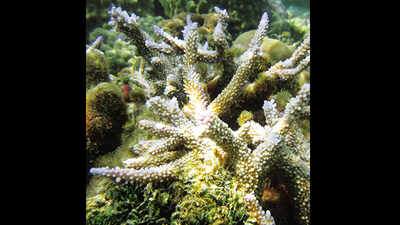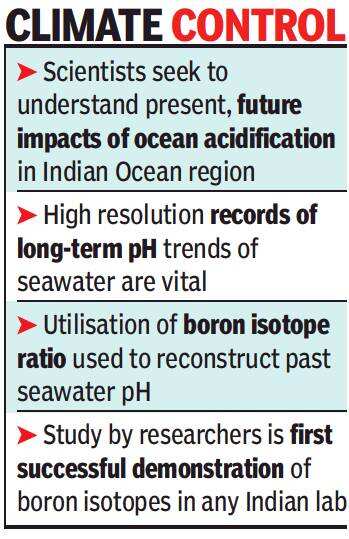Corals under stress due to variations in oceanic acidity

The Lakshadweep archipelago, which is India’s only coral island chain, is 200-440 km off the west coast of the mainland in the Arabian Sea
PANAJI: Coral reefs in the Indian Ocean along with the marine life that thrives in the coral ecosystem are expected to come under relentless stress due to an increase in ocean acidification and global warming,” say scientists. Climate scientists say that because of the extreme variation in acidity of the oceans and a rise in frequency of such fluctuations, the health of the Indian Ocean flora and fauna is “precariously poised.”

Scientists from the National Centre for Polar and Ocean Research (NCPOR) - Goa, Anna University - Chennai and the Indian Institute of Science, Bengaluru used the Boron isotopes at NCPOR-Goa, a first for India. This is the first first time Indian researchers used coral records from the Lakshadweep coral reefs to reconstruct past ocean acidification trends in the Indian Ocean.
The unprecedented rise in carbon dioxide (CO2) concentration in the atmosphere is causing rapid acidification of the ocean as surface seawater absorbs the CO2. This, say scientists, poses a direct threat to marine flora and fauna such as coral reefs.
Coral reefs provide an important ecosystem for underwater life while also protecting coastal areas from ocean currents and storms.
Corals are actually clusters of thousands of marine animals called polyps, which provide a habitat for fish species.
“The first long-term pH record from the Indian Ocean enables us to determine the recent ocean acidification trend forced by anthropogenic CO2 rise as well as certain key physical oceanographic factors. Once we know this ocean acidification trend and variability with the atmospheric CO2 rise, impact assessment of ocean acidification for future CO2 scenarios can be done with better accuracy,” said principal investigator Dr Waliur Rahaman.
The Lakshadweep archipelago, India’s only coral island chain, is 200-440 km off the west coast of the mainland in the Arabian Sea.
While historic data for ocean acidification are available for the Pacific and Atlantic Oceans, no such records existed for the Indian Ocean till this study. This study has been published in one of the reputed journals of American Geophysical Union – Journal of Geophysical Research Biogeosciences.
Indian climate scientists and oceanographers are racing to understand the present and future impacts of ocean acidification in Indian Ocean region for which high resolution records of long-term pH trends of seawater are vital. Utilisation of boron isotope ratio to reconstruct past seawater pH is an area of research with immense significance for past ocean and climate studies. The study led by the Indian researchers is the first successful demonstration of boron isotope measurements in marine carbonates and reconstruction of past ocean pH in any Indian laboratory.
In this study, scientists discovered that physical oceanographic processes controlled by El Nino–Southern Oscillation (ENSO) control surface pH variability.
“As climate scientists predict an increase in ENSO events following future global warming scenarios, the short-term and rapid pH variability also called “pH extremes” are likely to increase hereafter,” said Rahaman.
He said that extreme variation in the pH levels will “relentlessly test the resilience and adaptability” of corals and other calcifiers in Arabian Sea.

Scientists from the National Centre for Polar and Ocean Research (NCPOR) - Goa, Anna University - Chennai and the Indian Institute of Science, Bengaluru used the Boron isotopes at NCPOR-Goa, a first for India. This is the first first time Indian researchers used coral records from the Lakshadweep coral reefs to reconstruct past ocean acidification trends in the Indian Ocean.
The unprecedented rise in carbon dioxide (CO2) concentration in the atmosphere is causing rapid acidification of the ocean as surface seawater absorbs the CO2. This, say scientists, poses a direct threat to marine flora and fauna such as coral reefs.
Coral reefs provide an important ecosystem for underwater life while also protecting coastal areas from ocean currents and storms.
Corals are actually clusters of thousands of marine animals called polyps, which provide a habitat for fish species.
“The first long-term pH record from the Indian Ocean enables us to determine the recent ocean acidification trend forced by anthropogenic CO2 rise as well as certain key physical oceanographic factors. Once we know this ocean acidification trend and variability with the atmospheric CO2 rise, impact assessment of ocean acidification for future CO2 scenarios can be done with better accuracy,” said principal investigator Dr Waliur Rahaman.
The Lakshadweep archipelago, India’s only coral island chain, is 200-440 km off the west coast of the mainland in the Arabian Sea.
While historic data for ocean acidification are available for the Pacific and Atlantic Oceans, no such records existed for the Indian Ocean till this study. This study has been published in one of the reputed journals of American Geophysical Union – Journal of Geophysical Research Biogeosciences.
Indian climate scientists and oceanographers are racing to understand the present and future impacts of ocean acidification in Indian Ocean region for which high resolution records of long-term pH trends of seawater are vital. Utilisation of boron isotope ratio to reconstruct past seawater pH is an area of research with immense significance for past ocean and climate studies. The study led by the Indian researchers is the first successful demonstration of boron isotope measurements in marine carbonates and reconstruction of past ocean pH in any Indian laboratory.
In this study, scientists discovered that physical oceanographic processes controlled by El Nino–Southern Oscillation (ENSO) control surface pH variability.
“As climate scientists predict an increase in ENSO events following future global warming scenarios, the short-term and rapid pH variability also called “pH extremes” are likely to increase hereafter,” said Rahaman.
He said that extreme variation in the pH levels will “relentlessly test the resilience and adaptability” of corals and other calcifiers in Arabian Sea.
FacebookTwitterLinkedinEMail
Start a Conversation
end of article
Quick Links
Delhi Air PollutionDelhi TemperatureChennai WeatherBangalore TemperatureCovid vaccination centres in DelhiCoronavirus in DelhiRTPCR test in GurgaonHyderabad RainPollution level in BangaloreDelhi SmogDelhi TemperatureNoida AQIGurgaon AQI todayFire in MumbaiMumbai RainsCovid 19 RT PCR Test in NoidaDelhi AQI todaySrinagar encounter

